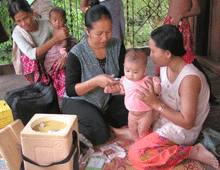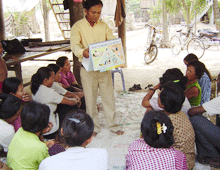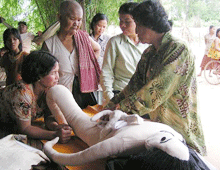SHARE
Services for the Health in Asian & African Regions (SHARE) = SHARE is a citizen sector organization (NGO) that engages in international cooperation mainly through providing health service.
HOME > Library > Reproductive health > What We Do
What We Do
How have we addressed our concerns for reproductive health issues in Cambodia? How have we incorporated these concerns into our project?
In Cambodia approximately 1 in 40 mothers die from complications in pregnancy and childbirth, an extremely high number compared to Japan's 1 in 6000. Cambodian mothers have a noticeably high death rate due to a multitude of factors including lack of education, chronic nutrition deficiency, lack of sanitation, inadequate hygiene, and poverty. These factors are complexly intertwined to create an environment in which mothers are much more likely to have problems during and before childbirth. SHARE hopes to make this environment even a little safer by focusing on educating and empowering mothers as well as training birth attendants and midwives.


In Cambodia, the majority of mothers give birth at home. According to our research, in the area where SHARE's project is located, it is estimated that traditional birth assistants (TBAs) who are not officially certified perform 60% of the childbirths. Although professional birth attendants are very effective in providing both moral and physical support during childbirth, Cambodian birth attendants' lack of education and formal training has reportedly contributed to the country's high maternal mortality rate. In recent years the Cambodian government has urged mothers to have their babies in hospitals, but the majority of mothers still choose to give birth at home because of the limited number of facilities and health staff, making it much more difficult to limit the number of mothers who use TBAs.
In light of these circumstances, SHARE provides training for TBAs and midwives in order to ensure the best care possible for mothers during childbirth. The training program teaches the basic skills necessary to deliver a baby, as well as methods of maintaining a sanitary and hygienic environment for both the baby and the mother. It emphasizes the importance of the birth attendants' role as a moral supporter of the mother, and teaches them to encourage mothers to have health checkups frequently both before and after giving birth. In addition, one of the goals of this program is to teach birth assistants to work collaboratively with midwives in order to make the mother feel more comfortable and be more prepared in the case of emergency. In creating a sense of mutual understanding between TBAs and midwives, pregnant mothers are able receive much greater support and assistance during birth. In order to foster communication between TBAs and midwives, SHARE encourages midwives to become involved in the planning and implementation of training programs. This process both increases their sense of responsibility and commitment while establishing trust between them and the TBAs.

In Cambodia approximately 1 in 40 mothers die from complications in pregnancy and childbirth, an extremely high number compared to Japan's 1 in 6000. Cambodian mothers have a noticeably high death rate due to a multitude of factors including lack of education, chronic nutrition deficiency, lack of sanitation, inadequate hygiene, and poverty. These factors are complexly intertwined to create an environment in which mothers are much more likely to have problems during and before childbirth. SHARE hopes to make this environment even a little safer by focusing on educating and empowering mothers as well as training birth attendants and midwives.
Health Education for Mothers in Local Villages
It is important for mothers to have access to education in order to acquire knowledge and make judgments based on that knowledge. Only when they are able to understand their own bodies will these mothers be able to make informed decisions about their health. With this belief SHARE has provided mothers in Cambodia with basic health education focusing on topics such as nutrition, hygiene, sanitation, the female body and the reproductive system, as well as providing them with relevant information concerning pregnancy, family planning, and HIV/AIDS. As becoming educated about important and immediate issues regarding health and pregnancy will help these mothers become more conscious about their own situation, SHARE has developed a fun and informative teaching method for mothers in Cambodia. SHARE's volunteers make all of the materials that are used during the programs, which are easy to understand and can even be used to teach those who are unable to read or write.

Training for Traditional Birth Attendants and Midwives
The degree of training of birth attendants and midwives is another factor that greatly affects both the mother and child's health during childbirth. If those who assist in the birth are not taught proper procedures, both the mother and the child's life could be in danger.In Cambodia, the majority of mothers give birth at home. According to our research, in the area where SHARE's project is located, it is estimated that traditional birth assistants (TBAs) who are not officially certified perform 60% of the childbirths. Although professional birth attendants are very effective in providing both moral and physical support during childbirth, Cambodian birth attendants' lack of education and formal training has reportedly contributed to the country's high maternal mortality rate. In recent years the Cambodian government has urged mothers to have their babies in hospitals, but the majority of mothers still choose to give birth at home because of the limited number of facilities and health staff, making it much more difficult to limit the number of mothers who use TBAs.
In light of these circumstances, SHARE provides training for TBAs and midwives in order to ensure the best care possible for mothers during childbirth. The training program teaches the basic skills necessary to deliver a baby, as well as methods of maintaining a sanitary and hygienic environment for both the baby and the mother. It emphasizes the importance of the birth attendants' role as a moral supporter of the mother, and teaches them to encourage mothers to have health checkups frequently both before and after giving birth. In addition, one of the goals of this program is to teach birth assistants to work collaboratively with midwives in order to make the mother feel more comfortable and be more prepared in the case of emergency. In creating a sense of mutual understanding between TBAs and midwives, pregnant mothers are able receive much greater support and assistance during birth. In order to foster communication between TBAs and midwives, SHARE encourages midwives to become involved in the planning and implementation of training programs. This process both increases their sense of responsibility and commitment while establishing trust between them and the TBAs.



